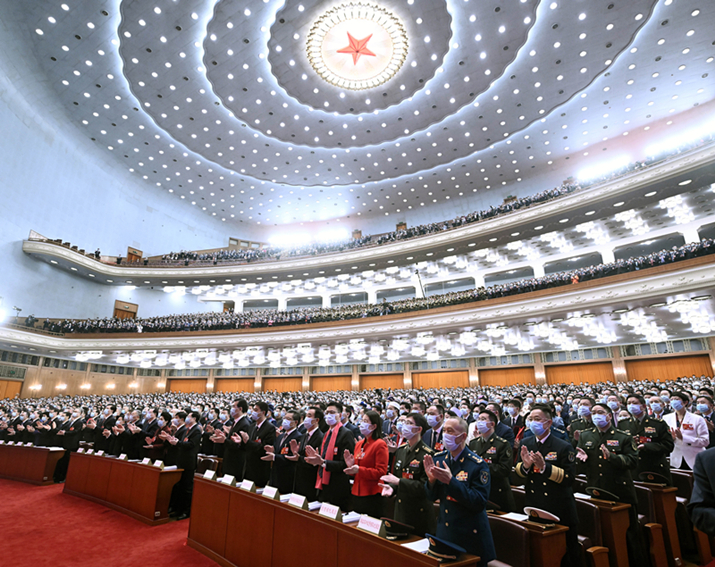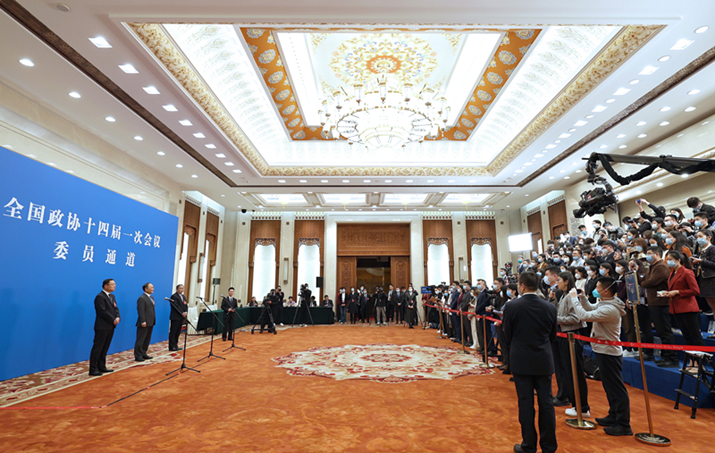|
||||||||||
| Home Nation World Business Opinion Lifestyle ChinAfrica Multimedia Columnists Documents Special Reports |
|
||||||||||
| Home Nation World Business Opinion Lifestyle ChinAfrica Multimedia Columnists Documents Special Reports |
| ChinAfrica |
| Sessions of Substance |
| China’s annual Two Sessions represent the country’s unique democratic process |
| By Charles Onunaiju 丨ChinAfrica Web Exclusive ·2023-03-08 |

The opening meeting of the First Session of the 14th NPC is held at the Great Hall of the People in Beijing, capital of China, on 5 March (Xinhua)
March saw the unfolding of key events in China’s political calendar that are closely followed worldwide: the annual sessions of the country’s top legislature and top political advisory body, commonly referred to as “Two Sessions.” The 14th National People’s Congress (NPC), the country’s top legislature and its top organ of state power, met in full session to review reports, and deliberate and pass legislation on important issues to accelerate the development of the country. The Chinese People’s Political Consultative Conference (CPPCC) also convened the first session of its 14th National Committee.
Apart from handling legislative matters, the Two Sessions also elect their standing working organs referred to as standing committees, which conduct the routine legislative and political advisory work of the two institutions. The people's congresses and the CPPCC are the institutional and structural representation of China’s system of multiparty cooperation and political consultation led by the Communist Party of China, giving full expression to democratic inclusion and consensus-building.
Setting policy directions
As the central part of China’s political life, the Two Sessions are hugely significant not only because of the democratic representation and participation, but also for outlining policy agenda and generating blueprints of administration and governance. The Two Sessions play a vital role in setting major policy directions, including on issues very relevant to reform and development.
The history and background of the two key national institutions shape their contemporary roles in the governance of modern China, especially as the country plays an increasingly pivotal role in global economic recovery and the international system. The CPPCC was developed from the revolutionary bases as a consultative platform for the patriotic alliance of Chinese people.
Following the establishment of the People’s Republic China in 1949, the CPPCC served as the legislative body until 1954 when the NPC was elected and convened. Following the establishment of the NPC as the country’s top organ of state power, the CPPCC continued as a top political advisory body. As the highest institutional platform for the Chinese people from different walks of life across the country, including ethnic groups, organisations, political parties, and professional fields, the CPPCC provides quality insights and suggestions on China’s contemporary modernisation. Its current contributions to the advancement of reform and modernisation are as significant as its role in building and driving an all-China coalition during the revolutionary struggle.
The CPPCC represents the combined strength and wisdom of all Chinese people in crafting a roadmap for achieving national goals and building a popular consensus around it. The uniqueness of the CPPCC in giving vital stakes to all sections of society through broad consultations and engagement remains critical to understanding the institutional and popular consensus that have driven China’s outstanding achievements and phenomenal development. The national consensus forged through consultations doesn’t mean an absence of disagreements; it means that all contending views and visions are integrated into a broad roadmap for national development.
The NPC is China’s top legislative body and the top organ of state power. As a platform for policy deliberations and a bearer of institutional credibility of China’s modern state, the NPC is well known for discharging its duty with the highest level of diligence and integrity. It gives expression to important legislative issues of national importance ranging from national security, economy and society to culture and foreign affairs, and endows the state administration and governance with vital political fibre and muscle. It is the national repository of legitimacy and supreme representative of popular will.
The broad representation in the NPC and its unique work style of the standing committee system, where its routine work is done by a fraction of its deputies elected at full sessions while the rest of the deputies return to their bases to have direct engagements with the people, may be far from the parliamentary orthodoxy of the West, but its viability is exemplified in its contributions in shaping China’s modern state.
If China’s unique political process and its system of multiparty consultative socialist democracy have delivered tangible results, it is not because of copying any other country, but creating its own unique path to development and modernisation.

Inspiring contribution
China’s Two Sessions would certainly deal with the issues of current concern for the Chinese people, but would also enhance China’s position as a major responsible nation in the world, whose role in global economic recovery is of utmost importance. China’s outstanding economic recovery in the past few months following the adjustment of its anti-COVID-19 policy would inspire recovery across the world. China’s economic growth, which fell to 3 percent last year because of the COVID-19 pandemic, is expected to rebound to about 5 percent this year, according to the Government Work Report delivered by then Chinese Premier Li Keqiang on 5 March at the opening meeting of the First Session of the 14th NPC, which could be a decisive factor in the global recovery efforts.
The Two Sessions are a window to understand the policy directions of the world’s second-largest economy, and serve as an example for countries seeking to carve their own strategies of development.
China’s unique path to modernisation and development speaks to the reservoir of original insights, strength and imaginations for building institutions and processes that are not only derived from its own unique experience, but are also aligned with its collective aspiration for good life.
African countries’ journey towards a good life indeed encountered difficulties and challenges, it’s not because of a lack of bold vision. It’s because of an absence of compatible institutional drivers to turn the vision into reality. There is a need to rethink the structure and nature of key institutions in order to align them with the goals of sustainable and inclusive development.
| About Us | Contact Us | Advertise with Us | Subscribe |
| Copyright Beijing Review All rights reserved 京ICP备08005356号-5 京公网安备110102005860号 |